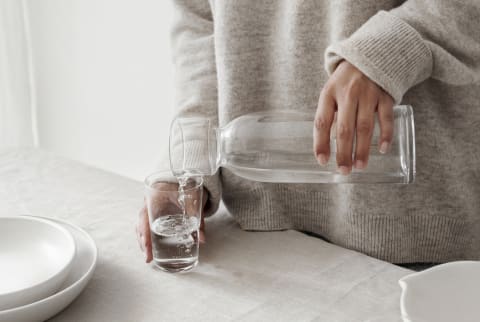Advertisement
How Much Water Should You Really Be Drinking? A Functional MD Explains


Quick! How much water should you drink in a day? If you instantly thought of the eight-by-eight rule (or eight 8-ounce glasses of water each day), you're not alone.
However, according to Dana Cohen, M.D., integrative medicine physician and co-author of Quench, it’s time we take a closer look at the pervasive gold standard. "Eight glasses of water a day—it comes from nowhere," she says on the mindbodygreen podcast. Because let's be honest: How can two people with completely different body types, environments, and lifestyles require the same amount of water? "It doesn't make any sense," she adds.
Rather, here's a better way to calculate your daily hydration quota and how to tell if you're not drinking enough.
How much water should you drink in a day?
According to Cohen, it's impossible to give everyone the exact same rule of thumb. But for some general guidance, she would say to drink half of your weight in ounces. So, for example, someone who weighs 150 pounds would want to drink around 75 ounces of water, which is about 9 cups.
It's a bit more of a personalized calculation than an 8-cups-per-day standard, but don't take it as gospel, either. Cohen says that number can totally vary depending on your lifestyle habits: "If you go on a ketogenic diet or a carnivore diet, you probably need around 75% of your weight in ounces because it's a dehydrating diet." Or let's say you have a thing for sweaty HIIT workouts: The more you sweat, the more fluids you lose, and the more water you'll need to drink.
Consequently, Cohen explains, you may need less water than others—don't force yourself to gulp down gallons just to meet a certain threshold. "There's this whole new thing with drinking a gallon of water a day, which is 16 glasses of water a day," she says. "That may be fine for some people, but for a lot of people, it's probably too much water. You can overdo it."
The bottom line? While you can follow a general quota, only you can know the exact ideal amount of water to drink daily. As Cohen notes, "The only way to know is to live in your body and know what it feels like."
Signs you might not be drinking enough water.
So, how do you know if you need to drink more than Cohen's general calculation? She tells us that your body sends little clues of low-grade dehydration. If you're dealing with any of the symptoms below, you might want to up your water intake:
- The color of your urine: A classic tip is to check the color of your pee. Is it straw-colored, dark yellow, or clear? According to Cohen, the marker for optimal hydration is pale yellow pee. "You don't want it to be clear, and you don't want it to be very concentrated or dark." (Check out this pee color chart to learn what each color means.)
- How often you go: Another easy marker, says Cohen, is how often you pee during the day. Generally, getting up to pee every two or three hours can signal solid hydration. "We're meant to do that," she explains. "I don't think most of us do that because we're sitting at our computers all day and working."
- Afternoon fatigue: You might associate the dreaded 3 o'clock slump with a blood sugar crash and promptly reach for a protein-packed snack to keep you sustained. However, says Cohen, "Most of the time, you're just not properly hydrated." Of course, blood sugar crashes do happen, but if your urine is bright yellow and you feel drowsy once the afternoon rolls around? You might want to pour yourself a glass of water.
The takeaway.
For some reason, eight glasses of water has become the daily gold standard for hydration. However, Cohen explains that there is no perfect quota for everyone to follow: Half your weight in ounces of water is a good place to start, but you might need to edit that goal based on your body and lifestyle.
Essentially, your body will let you know if it needs more water—so try to listen to the signs. "You need to not be cut off from your neck down and feel what it's like to be properly hydrated," Cohen adds. "And it's different for everybody."
Watch Next
Enjoy some of our favorite clips from classes
Enjoy some of our favorite clips from classes
What Is Meditation?
Mindfulness/Spirituality | Light Watkins
Box Breathing
Mindfulness/Spirituality | Gwen Dittmar
What Breathwork Can Address
Mindfulness/Spirituality | Gwen Dittmar
The 8 Limbs of Yoga - What is Asana?
Yoga | Caley Alyssa
Two Standing Postures to Open Up Tight Hips
Yoga | Caley Alyssa
How Plants Can Optimize Athletic Performance
Nutrition | Rich Roll
What to Eat Before a Workout
Nutrition | Rich Roll
How Ayurveda Helps Us Navigate Modern Life
Nutrition | Sahara Rose
Messages About Love & Relationships
Love & Relationships | Esther Perel
Love Languages
Love & Relationships | Esther Perel
What Is Meditation?
Box Breathing
What Breathwork Can Address
The 8 Limbs of Yoga - What is Asana?
Two Standing Postures to Open Up Tight Hips
How Plants Can Optimize Athletic Performance
What to Eat Before a Workout
How Ayurveda Helps Us Navigate Modern Life
Messages About Love & Relationships
Love Languages
Advertisement

What Men Are Getting Wrong About Mental Health, From A Psychologist
Stephen B. Poulter, PhD

Your Grandma's Go-To Supplement Is Once Again Popular (For A Good Reason)
Molly Knudsen, M.S., RDN

What Men Are Getting Wrong About Mental Health, From A Psychologist
Stephen B. Poulter, PhD

Your Grandma's Go-To Supplement Is Once Again Popular (For A Good Reason)
Molly Knudsen, M.S., RDN













